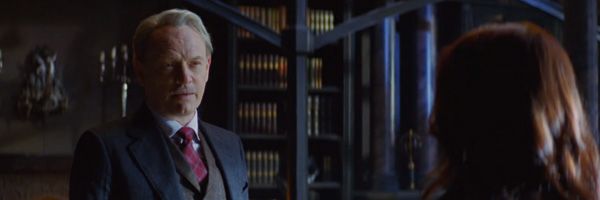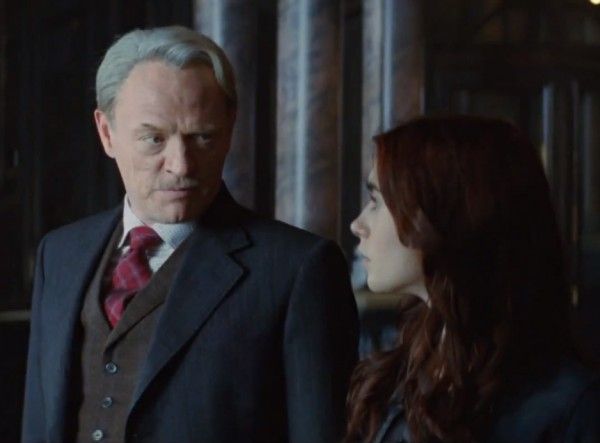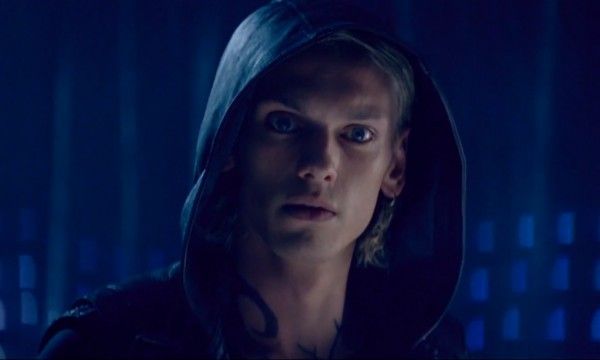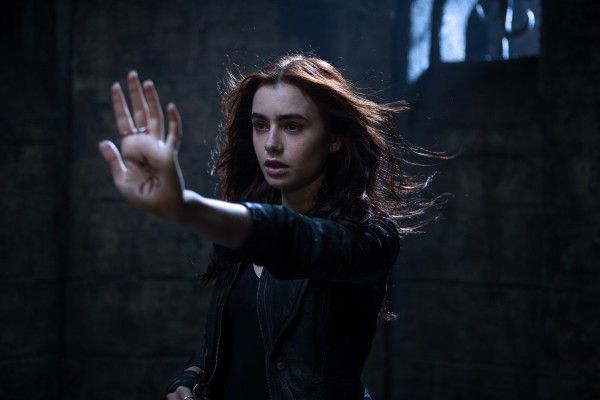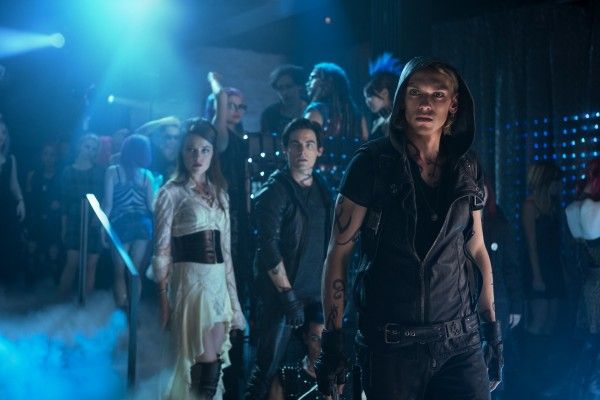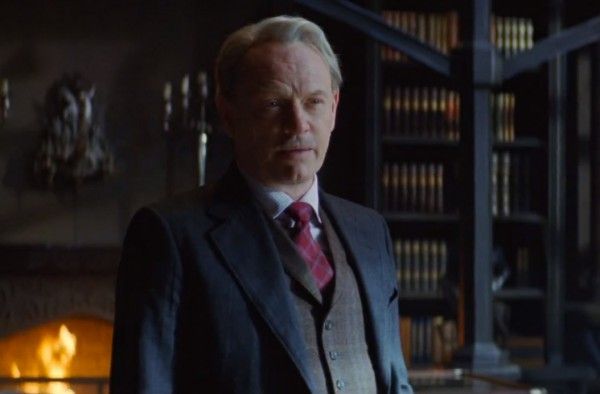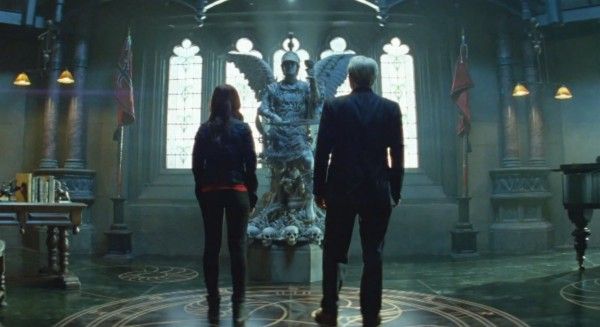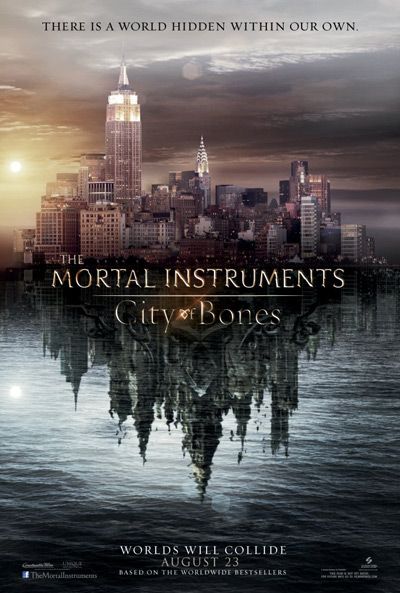Anytime you cast Jared Harris, you've made the right choice. That's because over the past two decades, and especially the last few years on Mad Men, Sherlock Holmes: A Game of Shadows, and Lincoln, Harris has played every type of role and always makes it look easy. In director Harald Zwart's The Mortal Instruments: City of Bones, Harris is taking on a new challenge: playing a Shadowhunter named Hodge Starkweather. In the universe of The Mortal Instruments, the shadowhunters are a secret tribe of warriors dedicated to ridding the earth of demons.
During a group interview on set last year in Toronto, Harris talked about how he got the role, the differences between the book and movie, his preparation process, Sherlock Holmes, what it's been like filming the action scenes, and a lot more. Hit the jump to either read or listen to what he had to say.
Before getting to the interview, here's the official synopsis and trailer:
The Mortal Instruments is a series of six young adult fantasy books written by Cassandra Clare. In the series’ first book, the #1 New York Times bestseller The Mortal Instruments: City of Bones, set in contemporary New York City, a seemingly ordinary teenager, Clary Fray, discovers she is the descendant of a line of Shadowhunters, a secret cadre of young half-angel warriors locked in an ancient battle to protect our world from demons. After the disappearance of her mother, Clary must join forces with a group of Shadowhunters, who introduce her to a dangerous alternate New York called Downworld, filled with demons, warlocks, vampires, werewolves and other deadly creatures.
As usual, I'm offering you two ways to get the interview: you can either click here for the audio, or the full transcript is below. The Mortal Instruments: City of Bones opens August 23.
Warning: Spoilers are discussed in this interview
Question: Talk a little bit about the project. Was this something you were familiar with before they approached you?
JARED HARRIS: Not at all, no.
What was your initial reaction? Did you read the book?
HARRIS: I read the script first. I didn’t have time to read the book before you go in. Normally, they tell you the sort of day before you go in to meet somebody that they’re actually meeting you. By the time they can figure out when they can make it happen, they let you know the day before. That’s not enough time to read a book. It’s enough time to read a script. So yeah, I read the script and then went in and met Harald. Afterwards, I read the book. Once I knew that I was going to be doing it.
So what grabbed you about the character then, and the concept?
HARRIS: He’s a fun character. You don’t know which side he’s playing on, which is always interesting to do. And yeah, he does a couple of 180s in the story. And it’s a fun world. It’s like this idea that’s not that far removed from, you mentioned Fringe, right? You know, that there’s parallel worlds, there’s worlds going on next to each other, and this shadow world exists alongside the world that we live in and that we can see. And you know, it’s fun. It’s imaginative, and it’s supposed to be good fun.
You have a tattoo on your neck right now.
HARRIS: That’s right, I used to be a Shadowhunter. I can still kick ass, man.
I’m just curious, have you worn the tattoos off set, and have you noticed you get treated differently?
HARRIS: Only by my girlfriend. She liked ‘em.
New York Magazine just did a list of the 25 most fanatical fan bases in entertainment and Mad Men was on there. This is a different kind of fanatical fan base, but what’s it like going into something that has such a deeply-rooted fan base?
HARRIS: Well, this is slightly different than the Mad Men one because it exists in a literary form first, the fans have their… It’s lived in their imaginations already. And I think it’s really important with things like that, that you have to honor the mythology that’s been created in the books, which they have done. Obviously, things sort of shift around on sets because of whatever circumstances, and that’s why it’s important to have read the book. Because you need to know that the choices and the ideas, the suggestions that you come up with to solve problems are consistent with the mythology that’s been created. So you need to know not just a bit about it, you need to know a lot about it.
But something like Mad Men, it exists in Matt Weiner’s mind. And no one can read what Season 6 and Season 7 is, because it’s in his head. Well, 7’s not in his head yet, but 6 is. So I would say in that sense, it’s probably a little freer, whereas in this one, you have an obligation to that mythology. And you don’t want to piss the fans off, you know? They’re the people who you’re hoping are going to be in that sort of initial wave of enthusiasm of telling people this is an exciting movie and it’s a great story, and will tell other people to go and see it because you’ve satisfied their curiosity when they see it. Of course, everything that’s in the book can’t be in the movie.
Did you film the part already where your character has to turn on Jace and turn on Clary?
HARRIS: Can we talk about that? That’s just happening now.
I was going to ask if it was fun turning on Jamie.
HARRIS: I mean, again, that’s slightly different in the book. Because again, that whole last section of the book, if you did it as a movie, would take an hour. From the point where Clary’s trapped in that sort of Cone of Silence or whatever that thing is, and then that whole sequence happens of him going through the portal with Jocelyn’s body, I mean that would be a whole hour of a movie from that point onwards. And at that point you’re near the climax of the film, so you need to telescope the events, which they’ve done very, very cleverly. But yes, we’ve done a lot of that stuff.
For people who haven’t read the book, can you introduce us to Hodge and what his relationship is with Clary?
HARRIS: Hodge is a Shadowhunter; he was at the Academy with Valentine and Jocelyn and Luke, and Pangborn and Blackwell I think as well. And he was part of Valentine’s circle who wanted to change the way the Clave used the Mortal Cup. For his part in what’s called The Uprising, he’s sentenced to remain in the Institute, and he has a curse or a spell put on him which means that he’s not allowed to leave. And he’s given the responsibility of teaching the young Shadowhunters. And his relationship with Clary is that she’s brought into the Institute by Jace, and he’s the adult who knows a lot more of her history than she does. And he’s slowly sort of drip-feeding it to her, not telling her the whole story outright, so he’s making her discover stuff for herself. And so you think that he’s there initially as a kind of tutor if you like, but he – again, I don’t want to give too much stuff away. If you’ve read the book, you know what happens, but that’s his initial relationship. Things go from bad to worse.
Do you have a multi-film contract or is this a one-and-done?
HARRIS: Are we allowed to talk about that? This is me. This is it. Just this one.
Talk a little bit about your preparation as an actor for each role. Some actors that I’ve spoken to will prepare as soon as they get a script, and some actors will wait until very close to production so it’s as fresh as it can be. For the roles that you do, could you talk about your preparation process?
HARRIS: It really depends. That all depends on how much time they’ve given you. Quite often, the casting process, the leading roles get done quite a long time ahead of time, because that’s how they nail down the marketing and the financing and everything. But the other roles that are in the movie, they tend to get done late. So I would like to have lots of time, but normally it means that you’ve either got a few weeks or maybe a month, at the most. A month is a luxury. Sometimes you’ve maybe got two weeks before you start on something. So you have to learn how to do it quickly. And the longer you have a role, that it lives in your imagination, the more you’re going to be able to contribute when you get on set. Because it’s really about your subconscious having time to sit with the part, so you’re out doing something and then something occurs to you, you know? It depends. I mean, you could be doing anything.
So the more time you have, you’ve given that process to happen, the more filled-in it will be. Because it’s very difficult to do if you’re trying to sort of logically and linearly go through the whole thing and try and, it’s like mathematics or something, trying to force these connections to happen. And you can do it that way, but it isn’t as satisfying as if it sort of builds in your mind without you being totally consciously aware of it. And obviously you’re thinking about it, but a lot of that thinking is completely useless and not helpful at all. The stuff that’s happening back there is very helpful.
Is there anything in this role for City of Bones that you got to do for the first time – whether it was an action sequence or anything along those lines?
HARRIS: Well, I have a fight scene with special weapons. But I mean, no, there’s all sorts of parts of other stuff that have been familiar from before. No, I wouldn’t say so. I have a scar, which I didn’t have before. A good prosthetic scar, a wig, a white wig. Kind of grey hair wig, stuff like that. Which is a bit shocking. You look in the mirror and you see what you might be like a couple years from now. [laughs]
You’ve been in several sort of occult roles…
HARRIS: This year, I’ve done three, for fuck’s sake! What’s going on? I’ve done three. I did a movie called The Quiet Ones, which was about a guy who’s investigating paranormal events. Which actually, there’s a thing called “Finding Philip,” [Note: it’s actually “Conjuring Up Philip”] which was a Canadian professor called Iris Owens, and it was about recreating a poltergeist. And they did it in the Toronto television studio, and it exists online. They did this thing where they get this table to levitate and all this stuff. But anyway, so it was that, but of course, because it’s a horror movie, it all goes terribly wrong. And then I played the Devil. And then now I’m in this film, which is all about demons and shit, so yeah, it’s been a weird year for that.
And then even before that, you did Moriarty, you did the John Carpenter movie.
HARRIS: That wasn’t occult. Moriarty wasn’t an occult figure.
But is there something that appeals to you about that?
HARRIS: I’ve got red hair and an English accent, I don’t know. It’s work, man. [laughs]
By Hollywood standards, Lily and Jamie are still up-and-comers. So what’s it been like working with this new generation and the younger cast?
HARRIS: It’s good, you know. They have a lot on their plate, and I’m there supporting them, trying to make sure that I can take some of the load off them and not drop the ball. But they’ve been doing it for a long time. Nowadays you find that a lot of the youngsters have been doing it almost as long as you have, because they’ve been doing it since they were 6, you know? So they’re all pros.
I want to ask a Sherlock Holmes question. Obviously, with Sherlock Holmes, you never really know if anyone is truly gone. I wanted to know if you think that possibly you could’ve survived.
HARRIS: I mean, yeah, it’s possible. It’s possible. I think they’re working on the script of 3 right now, I haven’t heard anything. I’ve no idea what their plans are. Looking at the way that 1 and 2 went, they tend to sort of move on from not keeping the villains around, so I’ve no idea. They haven’t talked to me about it, put it that way.
I could’ve survived. He survived. You know, I really could’ve. I even looked into it. See, now apparently, you know how they say when you fall into water, it’s like hitting concrete, right? But in a waterfall, because there’s so much air mixed up with the water, it’s actually possible to land, if you land into the water where the water’s been churned up, that you can survive that. It’s the rocks underneath that are gonna kill you, but it’s not like hitting concrete from a hundred feet. So I could definitely have survived.
I would think that one of the two of you definitely survived. And I would like to think that they’re smart enough to realize…
HARRIS: You know, send a blog off to Guy and Robert. They’re scripting as we speak.
I am curious though, right now there’s a Sherlock Holmes on CBS, the BBC is doing an incredible job with Sherlock, and there’s the Sherlock Holmes movie.
HARRIS: Well, then there’s House as well. House was Sherlock Holmes.
I’m just curious what you think is the…
HARRIS: What’s the attraction of it? Someone who’s incredibly smart, but really, he’s not smart enough to help himself. Because there’s always something damaged about that character. And you know, they’re good mysteries. As stories, you’re promised that when you get to the end, you will feel almost as smart as Sherlock Holmes, because you’re like, “Ah! Yeah, I almost got that!” They make you feel clever, I think.
Before Hodge turns to the dark side, he’s a little bit like the Professor X of this world. Was there anybody, either a character or someone from real life, be it a professor or even a philosopher that you liked that you had in the back of your mind while you’ve been doing this?
HARRIS: In this, in the film version, they play the moral conundrum, they take it a lot further. And that’s what was interesting about the character, is someone who knows what the right thing to do is, but for his own reasons, is making a different deal, because he’s trying to change his circumstances. But he knows the difference between the right thing and the wrong thing to do, and he’s not delusional in the sense that he doesn’t think that he’s doing something for the betterment of mankind or some bullshit like that. He knows that what he’s doing is purely to get his own ass out of the situation that he’s stuck in.
You know, in that sense… I went to English boarding school. There were teachers that sort of reminded me of him. I was in boarding school in, I think it was ‘68, and we had teachers there who’d fought in the Second World War, and there was something of that sort of faded glory about them. Now, they were teachers teaching a lot of snotty, badly-behaved kids. There were all boys in the school, who weren’t interested at all in what they had done only 15 or 20 years beforehand. And it’s not that long ago, really. But to a kid of 7, it might as well be a hundred years ago, you know? But yeah, so there was something about that, and you could see that they were frustrated by the fact that they had to look after these fucking awful children. And they probably just wanted to bat us round the head, but they weren’t allowed to. But yeah, a little bit of stuff like that, but no specific historical character.
How was filming the action scenes for this?
HARRIS: Well, I haven’t done those yet. No, we’re just practicing them now. But what’s great fun is I get to fight Dredger from Sherlock Holmes. He’s a fucking enormous man. So it’s been fun, because really, when you do all these fight scenes, you try and jazz ‘em up and everything. And then I sit there and I go, “Listen, if this guy hit me, I’d collapse. I’d crumble if he actually managed to actually connect with me, because the man’s huge.” But I was really excited that I was fighting him, because I fucking loved him in that movie. So yeah. We do them next week, I think.
How many moves is the sequence?
HARRIS: It’s getting longer. It got longer today. So, don’t know.
For more from our Mortal Instruments set visit:
- 35 Things to Know About THE MORTAL INSTRUMENTS: CITY OF BONES From Our Set Visit
- Lily Collins Talks Script Changes, the Project's Two-Year Development, Chemistry with the Cast, & More on the Set of THE MORTAL INSTRUMENTS: CITY OF BONES
- Jamie Campbell Bower Talks Fake Tattoos, Female Protagonists, Working with Lily Collins, and More on the Set of THE MORTAL INSTRUMENTS: CITY OF BONES
- Author Cassandra Clare Talks Casting, Changes from the Book, and More on the Set of THE MORTAL INSTRUMENTS: CITY OF BONES
- Director Harald Zwart Talks Collaborating with the Author, Why He Wanted to Make the Film, & More on the Set of THE MORTAL INSTRUMENTS: CITY OF BONES
- Producers Don Carmody and Robert Kulzer Talk the Development Process, Casting, and More on the Set of THE MORTAL INSTRUMENTS: CITY OF BONES

